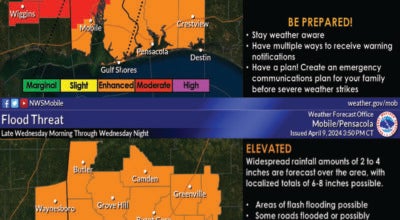DHR desperately seeking foster familes
Published 5:00 am Wednesday, December 7, 2016
Only 11 homes to foster 34 children
STORY BY NICOLE BURNS
In this time of tender hearts and giving spirits, Escambia County DHR officials hope you would consider opening your home and hearts to foster local children. Right now, they only have 11 foster homes housing 34 children currently in the system.
“Most of our teenagers are placed out of county at residential placement and group homes,” said Tracie James-Mauldin, Senior Social Work Supervisor for Escambia County DHR. “We really need foster homes that are willing to take teenagers.”
DHR officials know the importance of maintaining a feeling of security the children in their care need to have after being removed from their parents or guardians. They don’t take that responsibility lightly.
“The best placement for a child is a homelike placement, not in these residential institutions, to make it feel like home,” said James-Mauldin. “Having one family is important. Visitation isn’t as often because some families can’t make it that far so they lose contact. They may only get to visit once a month.”
And maintaining contact with parents or family is important because the goal is always to reunite families if possible.
“When we’re working with a family, we’re working with two plans,” said James-Mauldin. “The Adoption Safe Families Act limits the time children can stay in foster care. Basically we have 12 months to work with that family. If they’re not making progress by the time we get to that 12 months we have an alternate plan which is either a relative placement or termination of parental rights.”
Irene Johnson, Resource Worker for Escambia County DHR said the day in the life of a local foster parent would be no different than your day as a parent. “If someone is working, we provide daycare for foster parents. It’s just like your child. You would take your child to appointments. Our children can do extracurricular activities after school. They can go spend the night with their friends. We want them to have a normal childhood,” said Johnson.
Signing up to become foster parents is easy, but you will go through a series of background and financial checks and a 10 week training course that begins again in 2017. “When we go through our training, we tell people that we’re not looking for quantity we’re looking for quality,” said Johnson.
“We’re looking for someone who loves children, and won’t be judgmental. A lot of foster children have behavioral problems so you have to be willing to work with that child even with their behavior. It’s just hanging in there with these children like you would your own child.”
“We don’t want to see our children remain in foster care, but we are seeing a lot of our teenagers that are remaining in foster care because there are not a lot of families who want to adopt them,” said James-Mauldin. “They have that stigma of not wanting to foster or adopt a teen. You’ll see a lot of them on our website.”
Alabama’s Heart Gallery website is an online resource of the Alabama Department of Human Resources. It lists the pictures and stories of children who are up for adoption across the state. You can click on the list of individual children or siblings at heartgalleryalabama.com.
“If we get a large sibling group, we would have to split them up because we just don’t have the resources to place them together,” said James-Mauldin.
Local foster parents aren’t encouraged to be a temporary part of these children’s lives. “They’re impacting these children’s lives. They’re a very important part of these children for the point of time that they have them. We definitely encourage them to stay involved when the children return to their family, we encourage that partnership between the foster parents and the parents.”
Foster parenting isn’t for everyone and officials at Escambia County DHR understand, but said there are ways you can still help. “If some people can’t foster, they can do something else,” said Johnson. “Mentoring, cooking a meal, babysitting. If they don’t think they can foster, maybe they can help support the ones that are fostering.”
To learn more about fostering, or helping support those who do, you can contact Irene Johnson at 251-809-2044.
There are also a lot of foster parenting resources available online at www.dhr.state.al.us.





